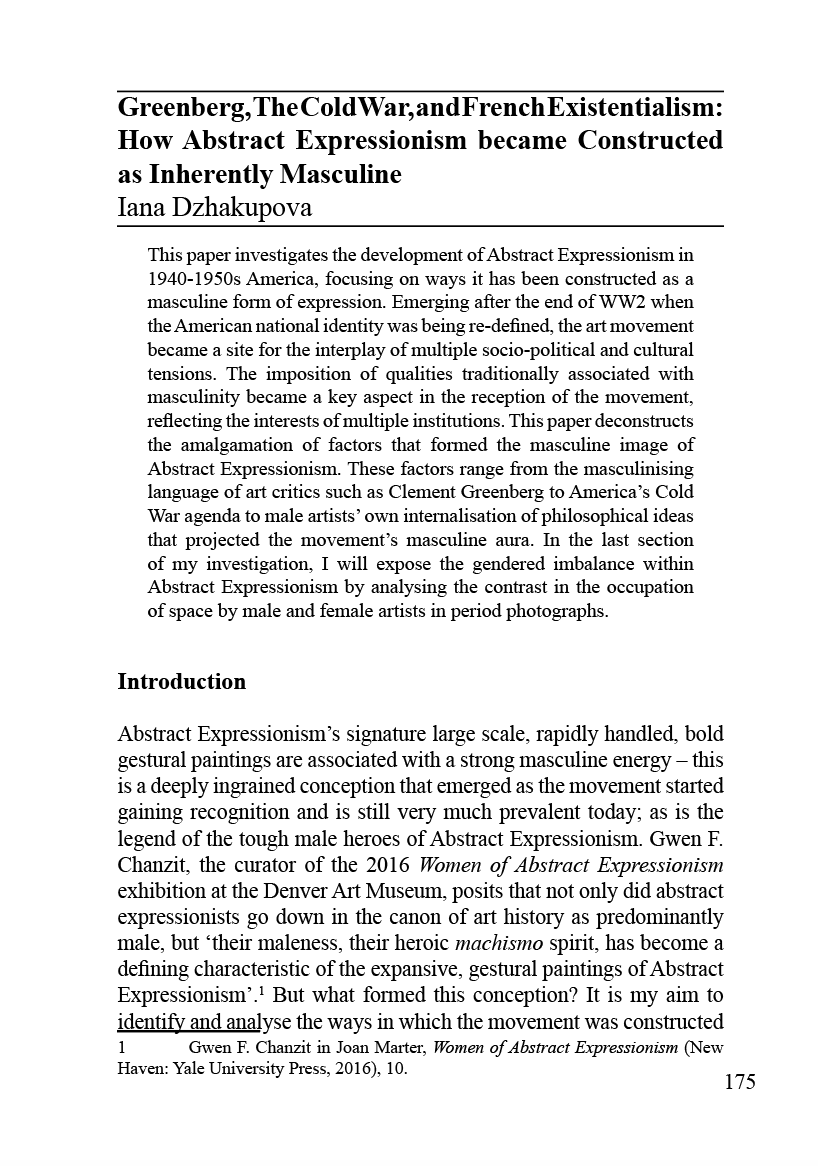Greenberg, The Cold War, and French Existentialism
How Abstract Expressionism became Constructed as Inherently Masculine
DOI:
https://doi.org/10.36399/GroundingsUG.15.139Keywords:
Abstract Expressionism, America, United States, Gender, Masculinity, Greenberg, de Kooning, Jackson Pollock, Lee Krasner, Corinne West, Michael WestAbstract
This paper investigates the development of Abstract Expressionism in 1940-1950s America, focusing on ways it has been constructed as a masculine form of expression. Emerging after the end of WW2 when the American national identity was being re-defined, the art movement became a site for the interplay of multiple socio-political and cultural tensions. The imposition of qualities traditionally associated with masculinity became a key aspect in the reception of the movement, reflecting the interests of multiple institutions. This paper deconstructs the amalgamation of factors that formed the masculine image of Abstract Expressionism. These factors range from the masculinising language of art critics such as Clement Greenberg to America’s Cold War agenda to male artists’ own internalisation of philosophical ideas that projected the movement’s masculine aura. In the last section of my investigation, I will expose the gendered imbalance within Abstract Expressionism by analysing the contrast in the occupation of space by male and female artists in period photographs.
References
Ashton, Dore. The New York School: a cultural reckoning. Berkeley: University of California Press, 1992.
Chave, Anna. “Pollock and Krasner: script and postscript.” Res: Anthropology and Aesthetics, no. 24 (Autumn 1993): 95-112.
Clark, T.J. “In Defence of Abstract Expressionism.” October 69, (Summer 1994): 22-48.
de Beauvoir, Simone. The Second Sex. New York: Vintage Books, 2010.
Doss, Erika. Benton, Pollock and the Politics of Modernism: From Regionalism to Abstract Expressionism. Chicago: The University of Chicago Press, 1991.
Greenberg, Clement; O’Brian, John, ed. The Collected Essays and Criticism. Vol. 2. Chicago: The University of Chicago Press, 1988.
Greenberg, Clement; O’Brian, John, ed. The Collected Essays and Criticism. Vol. 4. Chicago: The University of Chicago Press, 1988.
Kosuth, Joseph. “Art After Philosophy.” Studio International 178, no. 915 (October 1969): 134-137.
Kozloff, Max. “American Painting During the Cold War.” Artforum, (May 1973).
Leja, Michael. Reframing Abstract Expressionism: Subjectivity and Painting in the 1940s. New Haven: Yale University Press, 1993.
Leja, Michael. “Jackson Pollock: Representing the Unconscious.” Art History 13, no. 4 (December 1990): 542-565.
Marter, Joan, ed. Women of Abstract Expressionism. New Haven: Yale University Press, 2016.
Minissale, Gregory. “The Invisible Within: Dispersing Masculinity in Art.” Angelaki: Journal of Theoretical Humanities 20, no. 1 (March 2015): 71-83.
Motherwell, Robert. “The Modern Painter’s World.” Revisiones, no. 6 (2010): 69-78.
Rosenberg, Harold. “The American Action Painters.” ARTnews, (December 1952): 75-84.
Sandler, Irving. The Trumph of American Painting. London: Pall Mall Press, 1970.
Varnedoe, Kirk, and Pepe Karmel. Jackson Pollock. London: Tate Gallery Publishing, 1998.
Wagner, Anne M. “Lee Krasner as L.K.” Representations, no. 25 (Winter 1989): 42-57. University of California Press.

Downloads
Published
Issue
Section
License
Copyright (c) 2024 Iana Dzhakupova

This work is licensed under a Creative Commons Attribution 4.0 International License.
The CC BY 4.0 license is a Creative Commons license. This is a non-copyleft free license that is good for art and entertainment works, and educational works. It is compatible with all versions of the GNU GPL; however, like all CC licenses, it should not be used on software. People are free to: Share — copy and redistribute the material in any medium or format; Adapt — remix, transform, and build upon the material for any purpose, even commercially. The licensor cannot revoke these freedoms as long as you follow the license terms. But they must conform to the following terms: Attribution — You must give appropriate credit, provide a link to the license, and indicate if changes were made. You may do so in any reasonable manner, but not in any way that suggests the licensor endorses you or your use. No additional restrictions — You may not apply legal terms or technological measures that legally restrict others from doing anything the license permits.
Please check individual article PDF copies to see if any additional restrictions apply.







